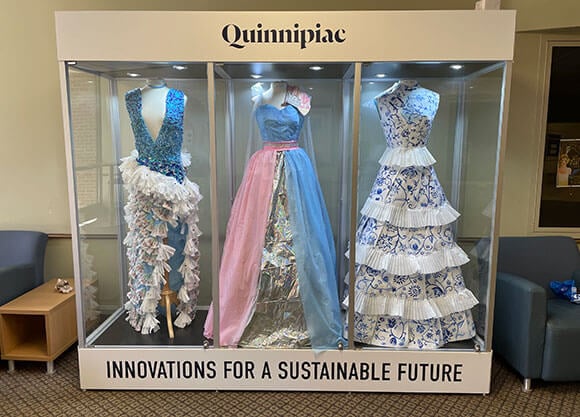
Cultivating green skills for a transforming economy
May 09, 2022

May 09, 2022

To that end, the importance of green skills, or skills needed to assist a green economy, cannot be overstated. In response, Quinnipiac continues to evolve its green learning opportunities in a variety of industries. The recent introduction of three sustainably focused bachelor’s degrees (a BS in environmental science, a BA in sustainability and environmental policy and a co-major BA in environmental studies) is only one way the university extols Earth consciousness.
A recent Global Green Skills Report from LinkedIn explored the trends of a greening economy and its workers. Between 2015 and 2021, green talent increased from 9.6 percent to 13.3 percent. During the same time period, the number of American renewables and environmental jobs increased by 237 percent, while there was only a 19 percent increase in oil and gas jobs.
With the rise of the conscious consumer comes an increased focus on sustainable fashion. LinkedIn identified this as the fastest-growing green skill globally, growing an average of 90.6 percent from 2016 to 2020.
Eco Fashion Design, a course taught during the spring semester, teaches students to turn trash into fashion treasure. The course concludes with a fashion show on Earth Day where students display their upcycled creations. Post-COVID, the garments are displayed on mannequins instead of runway models.
At the beginning of the course, students gather objects most would consider being garbage. Some of these items include expired pasta, coffee filters, old textbooks and notebooks, old beads, tissue paper, paper shopping and trash bags, shower curtains, comic books, playing cards, tablecloths, plastic cups, wire netting, artificial flowers and surgical cloth, said Director of Operations of Business Centers and Professor Hanna Hejmowski.
“The course focuses on sustainability in action where students get to practice green skills: Turning trash into art by recycling, reusing and repurposing alternative materials and products that no longer serve any purpose,” said Hejmowski. “Throughout my eight years of teaching this course, my main goal has always been to empower students to think strategically about their education, and how practicing and applying green skills can positively impact the environment.”
This type of thinking is particularly important in fashion, which is the second most pollutive industry in the world, she said.
“The course helps students identify ways of becoming more environmentally conscious in their own daily lives, promotes creativity and sparks greater curiosity regarding sustainability,” said Hejmowski. “Learning and practicing green skills is essential to enable young people to participate fully in the transition to a more sustainable lifestyle or any profession they choose to pursue in their future careers.”

Quinnipiac Today is your source for what's happening throughout #BobcatNation. Sign up for our weekly email newsletter to be among the first to know about news, events and members of our Bobcat family who are making a positive difference in our world.
Sign Up Now